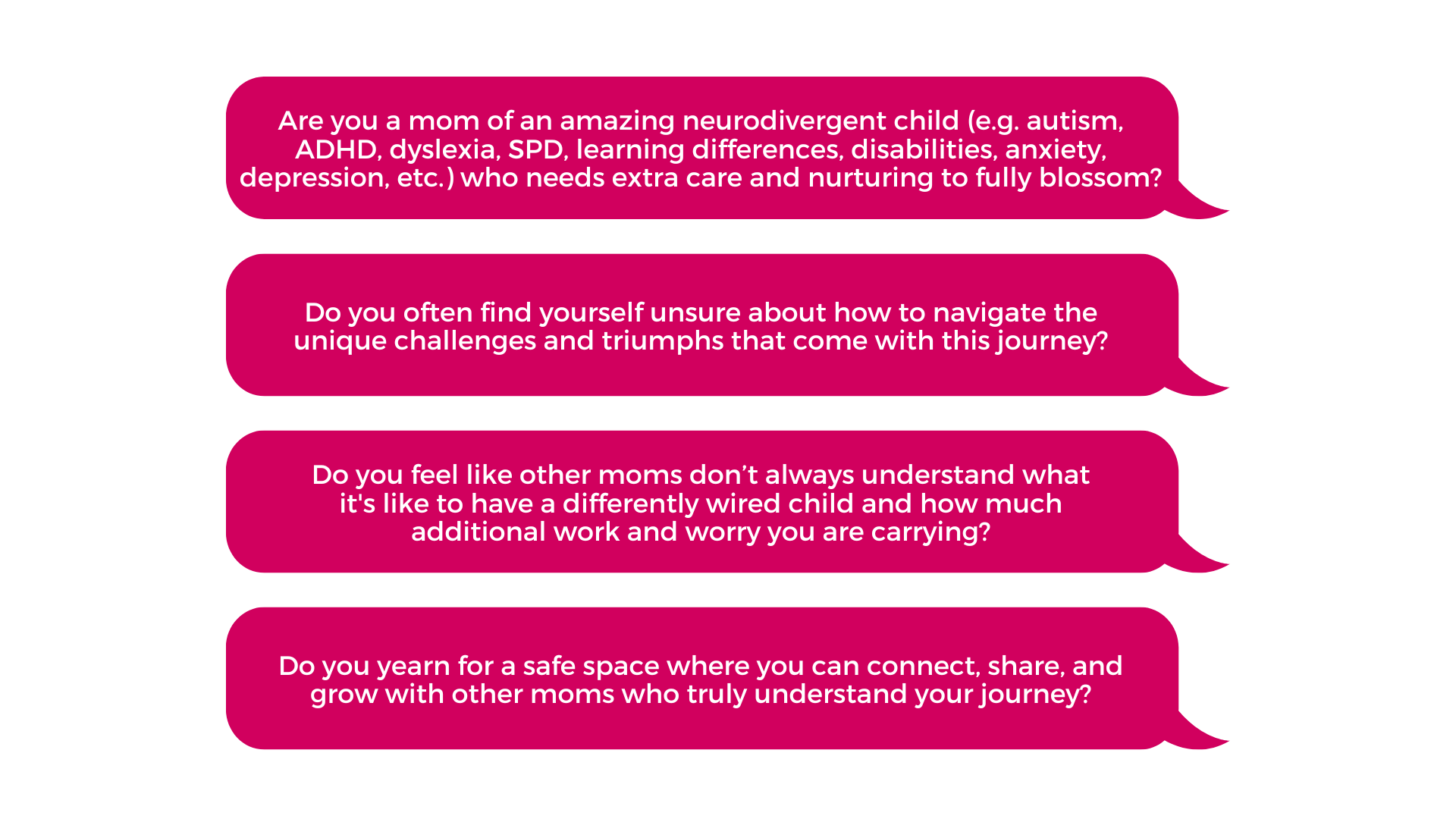Finding Community and Self-Care on the Journey of Mothering a Neurodivergent Child
Motherhood is a beautiful and transformative journey, filled with moments of joy, love, and endless adventures. But what happens when your child's path takes an unexpected turn (as mine did!)? Nurturing a neurodivergent child is a unique experience that demands immense strength, patience, and understanding. I WISH someone had talked to me about how to care for myself while I was caring for my kids YEARS AGO. And so here is my PSA… let’s talk about the importance of finding community in the whirlwind of emotions and responsibilities that come with mothering a neurodivergent child.
YOU ARE NOT ALONE!
First of all, what is Neurodivergence? Because I get that not everyone is familiar with this word.
When it comes to neurodivergence, there is no one-size-fits-all definition. Neurodivergence is an umbrella term that encompasses a wide range of neurological differences, including but not limited to autism spectrum disorder (ASD), attention deficit hyperactivity disorder (ADHD), dyslexia, and Tourette syndrome.
At its core, neurodivergence simply refers to any brain wiring that falls outside of what is considered “normal”. This can manifest in a variety of ways, from difficulty with social interaction and communication to sensory processing issues and repetitive behaviours.
While there is no “cure” for neurodivergence, early intervention and support can make a world of difference in terms of quality of life. For parents of neurodivergent children, finding community and self-care can be a challenge. However, it’s sooo important to remember that you are not alone on this journey – there are others who understand what you are going through.
Caring for YOURSELF
One way to care for yourself is to make sure you are getting enough rest. I know, this isn’t always easy when you have a child who has difficulty sleeping, but it’s important to do what you can to get the rest you need. Try to take breaks during the day if possible, even if it’s just for a few minutes. If you can, nap when your child naps.
Another way to care for yourself is to eat healthy meals and get regular exercise. This will help you maintain your energy levels and keep your body strong. It’s also vital to find time for social activities and hobbies that you enjoy. This can help you reduce stress and feel more connected to others.
It’s also helpful to seek out support from friends, family, or professionals if you are feeling overwhelmed or struggling with parenting. There are many resources available to parents of neurodivergent children, so don’t hesitate to reach out for help if you need it. One resource I love is my friend Elizabeth Sautter. She does incredible work with children and families.
Strategies for Dealing With Stress and Overwhelm
Another struggle of mine (mostly in the past, but every now and then I get a flare up) is overwhelm. And here’s the thing, there’s no one-size-fits-all solution and if you’ve struggled with this yourself I’m sure you’ve done your own research, but there are some strategies that really worked for me:
1. Take some time for yourself every day – even if it’s just 10-15 minutes. I call this a ME moment and it can be used for anything that brings you joy or relaxation, such as reading, taking a bath, going for a walk, or listening to music. Here is my 30 Day Self-Care Challenge. Enjoy!
2. Find a support system – whether it’s friends, family, or an online community. These people can offer understanding and practical advice when you’re feeling overwhelmed. If you haven’t found a community that resonates with you, check out Mom-ME Circle.
3. Set limits with your child’s care team – know when to say no to additional appointments or therapies. It’s okay to put your own wellbeing first sometimes. (I literally just did this with one of my daughter’s team members and it felt so good.)
4. Make sure you’re getting enough sleep and eating healthy meals. This will help you have the energy and patience you need to deal with stressors in your life.
5. Seek professional help if needed – talking to a therapist can be incredibly helpful in dealing with stress and overwhelm. I work with a therapist at Better Help and she is incredible.
Community Support and Resources
There are many community support and resources available for parents of neurodivergent children. Here are just a few:
1. The Autism Society of America provides information, resources, and support to individuals with autism and their families.
2. The National Autism Association offers support, resources, and advocacy for families affected by autism.
3. The Autism Parenting Magazine provides articles, resources, and support for parents of children on the autism spectrum.
4. The Special Needs Network provides services, resources, and support to families of children with special needs.
5. Easterseals offers programs and services to help children and adults with disabilities achieve their goals.
6. My signature program, Mom-ME Circle, gives moms and caregivers a unique chance to belong to a “sisterhood.” This is NOT a place to receive coaching, this is a place to be seen and heard. We talk a lot about the importance of self-care and other relevant topics.
Parenting a neurodivergent child can be an incredibly rewarding experience, but it can also be lonely, uniquely challenging and demanding. So, it’s important to make time for yourself, and to find ways to care for yourself both physically and emotionally.
If you or someone you know are looking for more support, I hope you’ll join us as we explore the power of self-care in navigating this extraordinary journey while embracing every milestone along the way.


